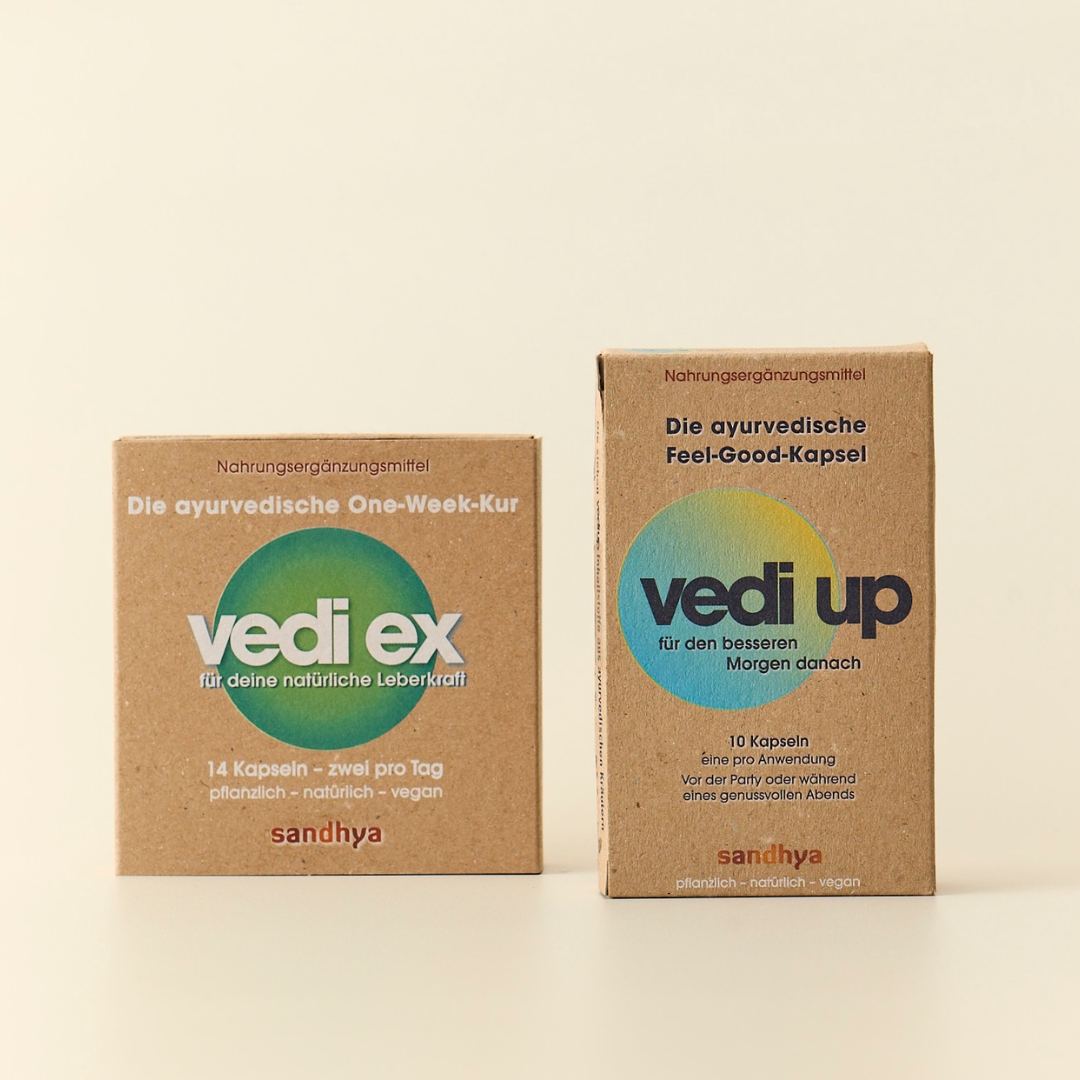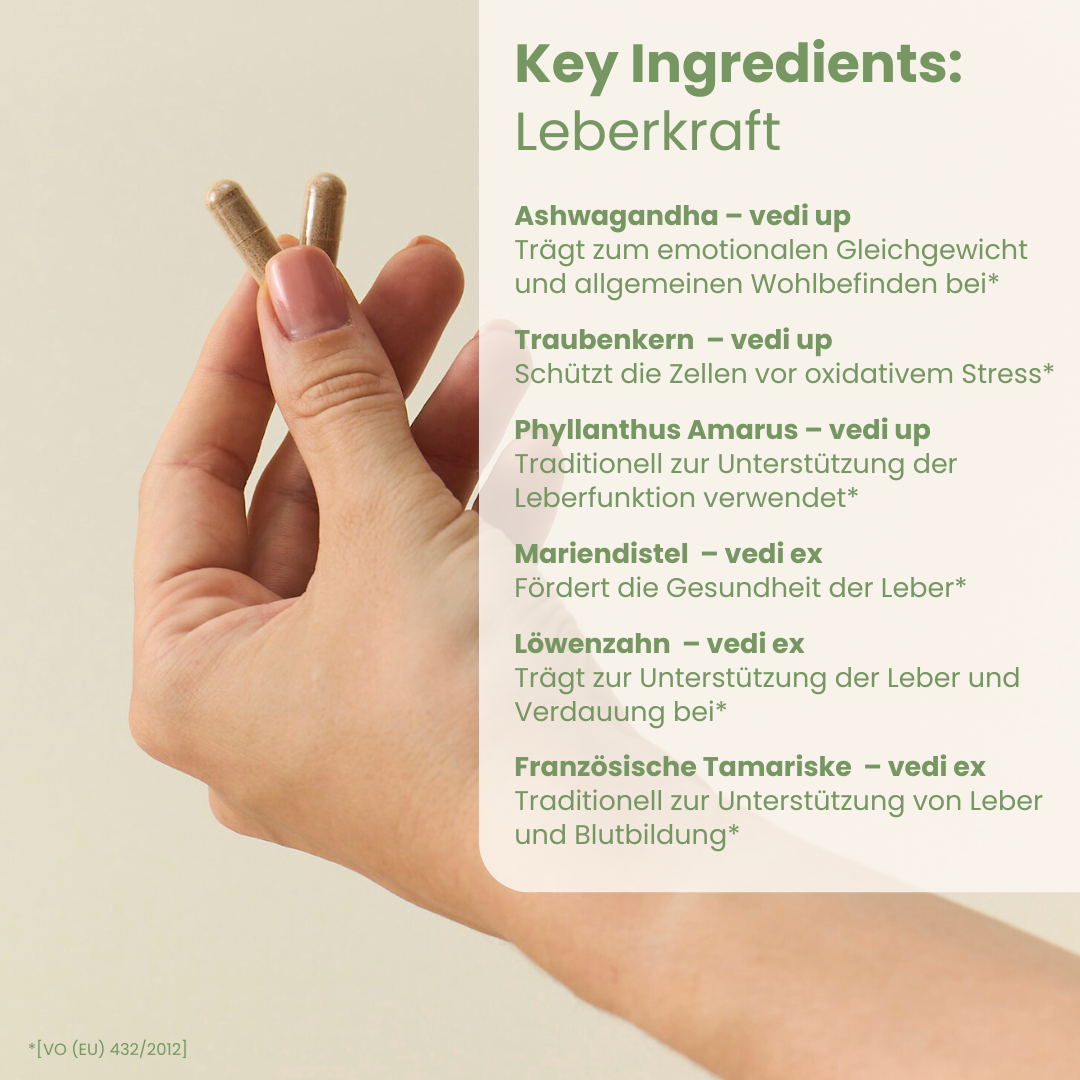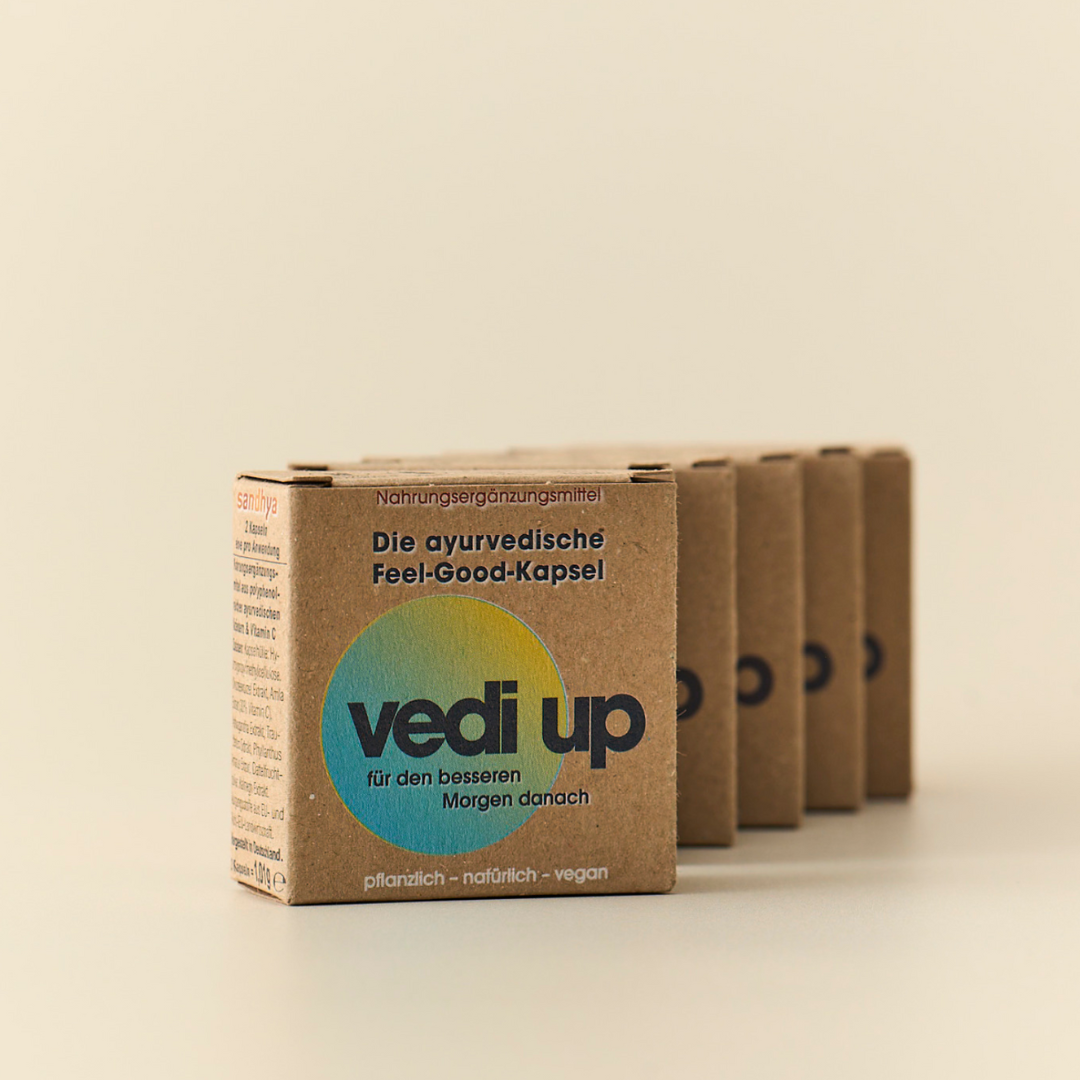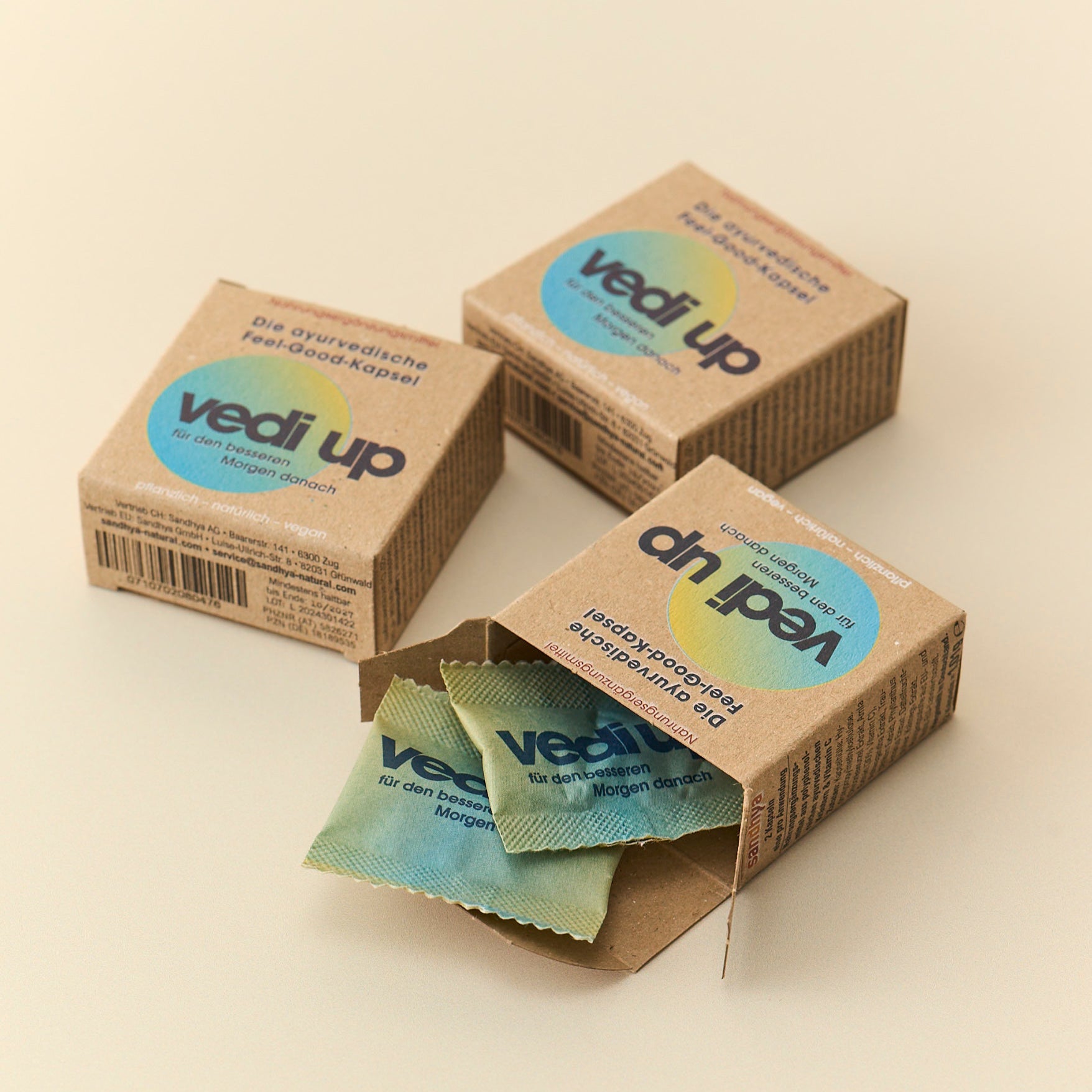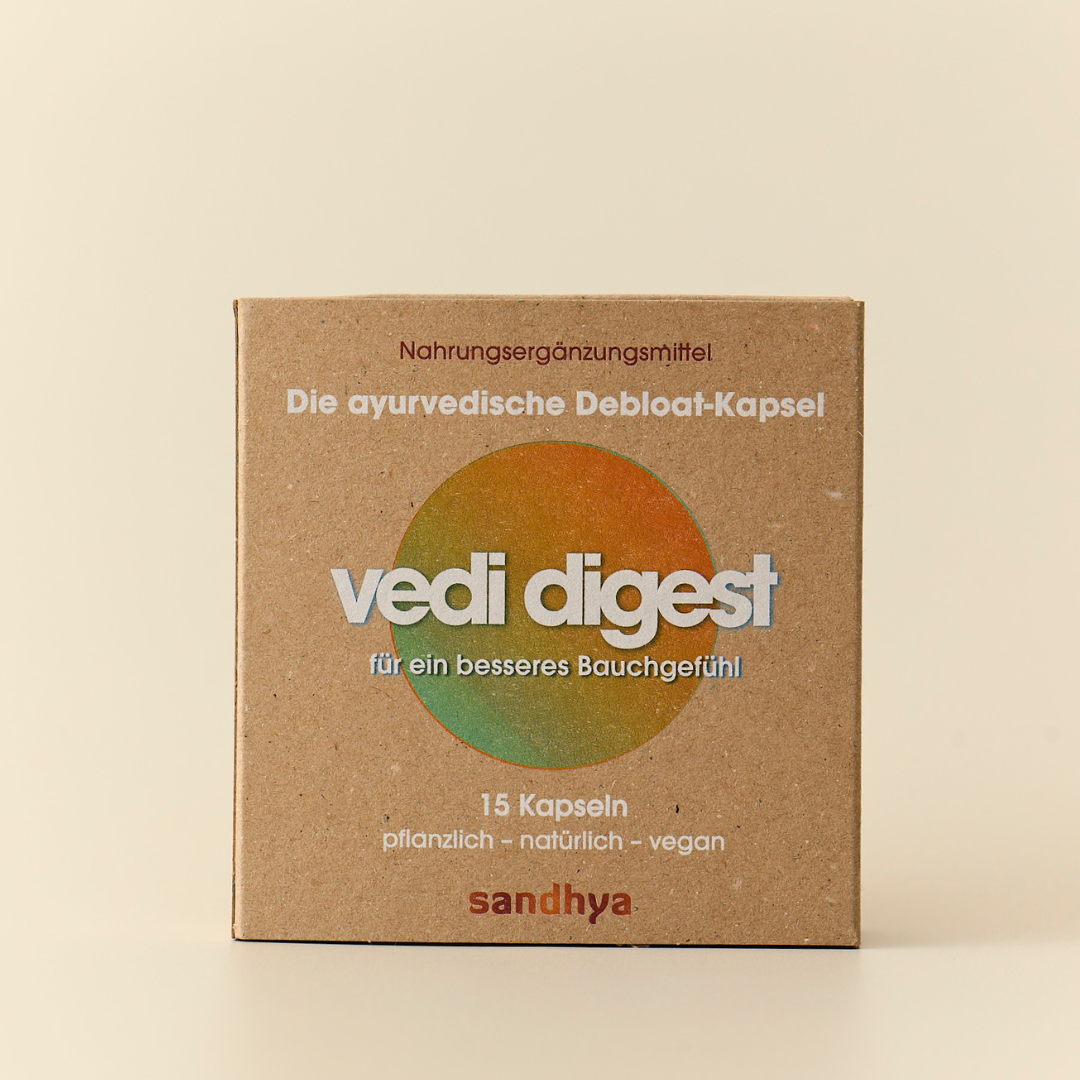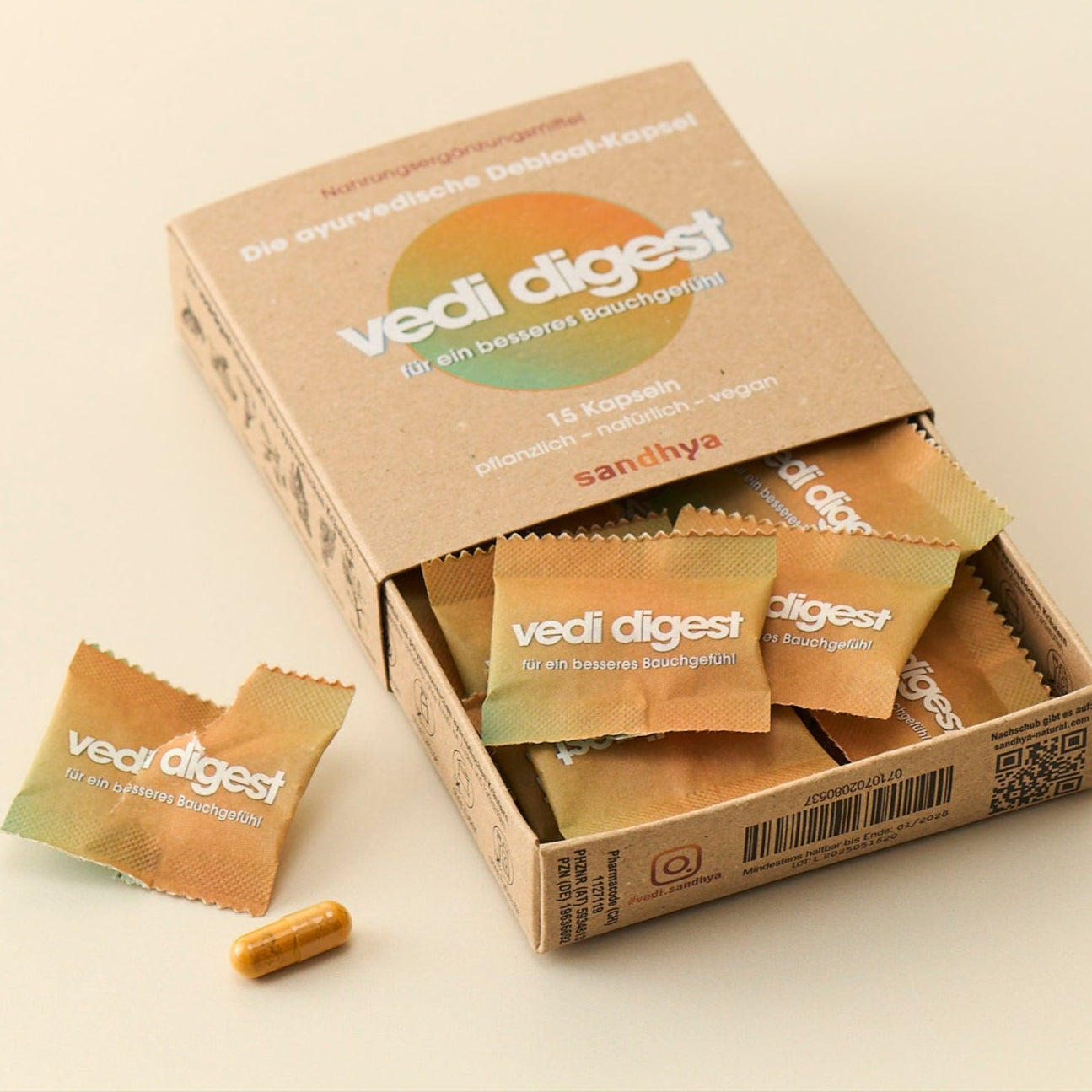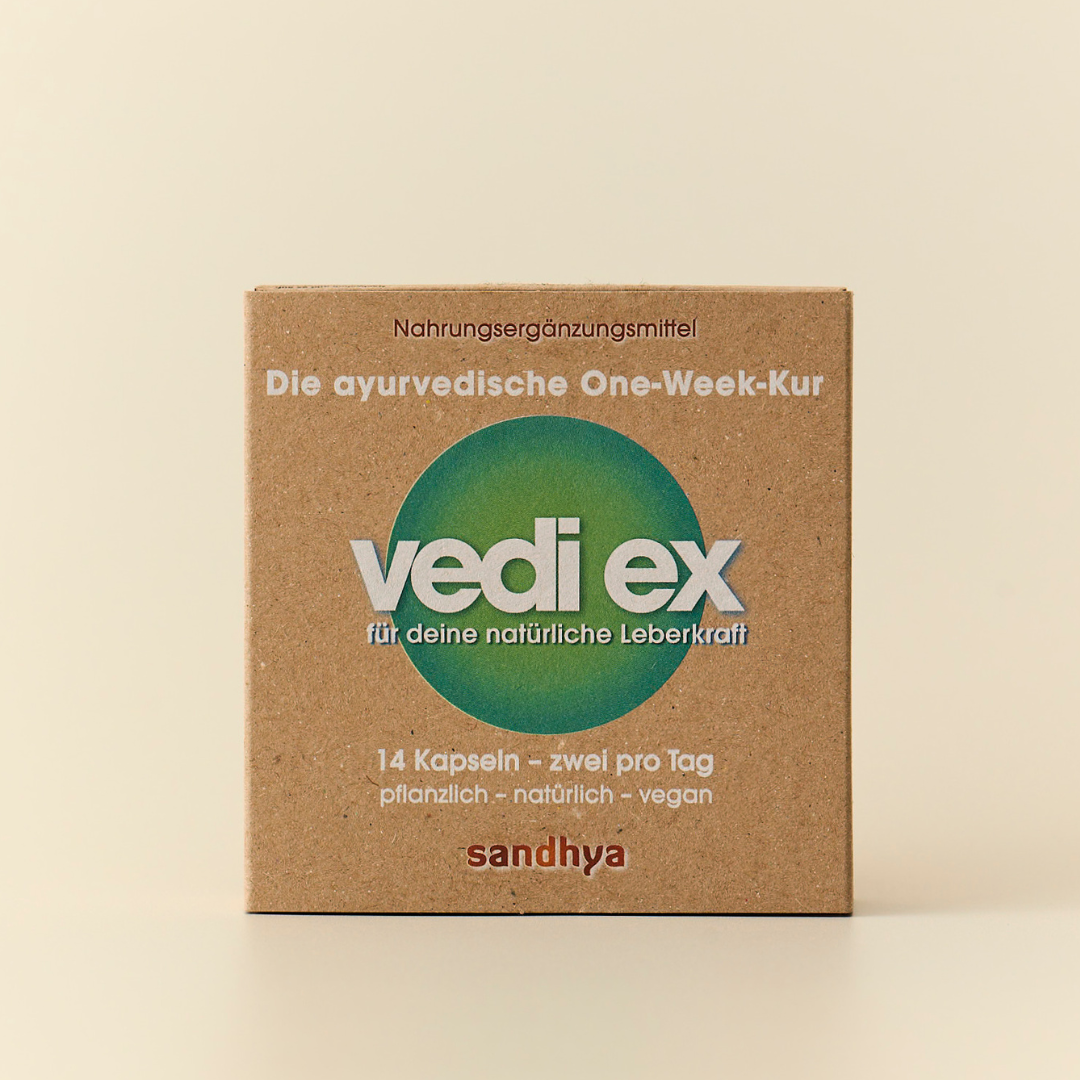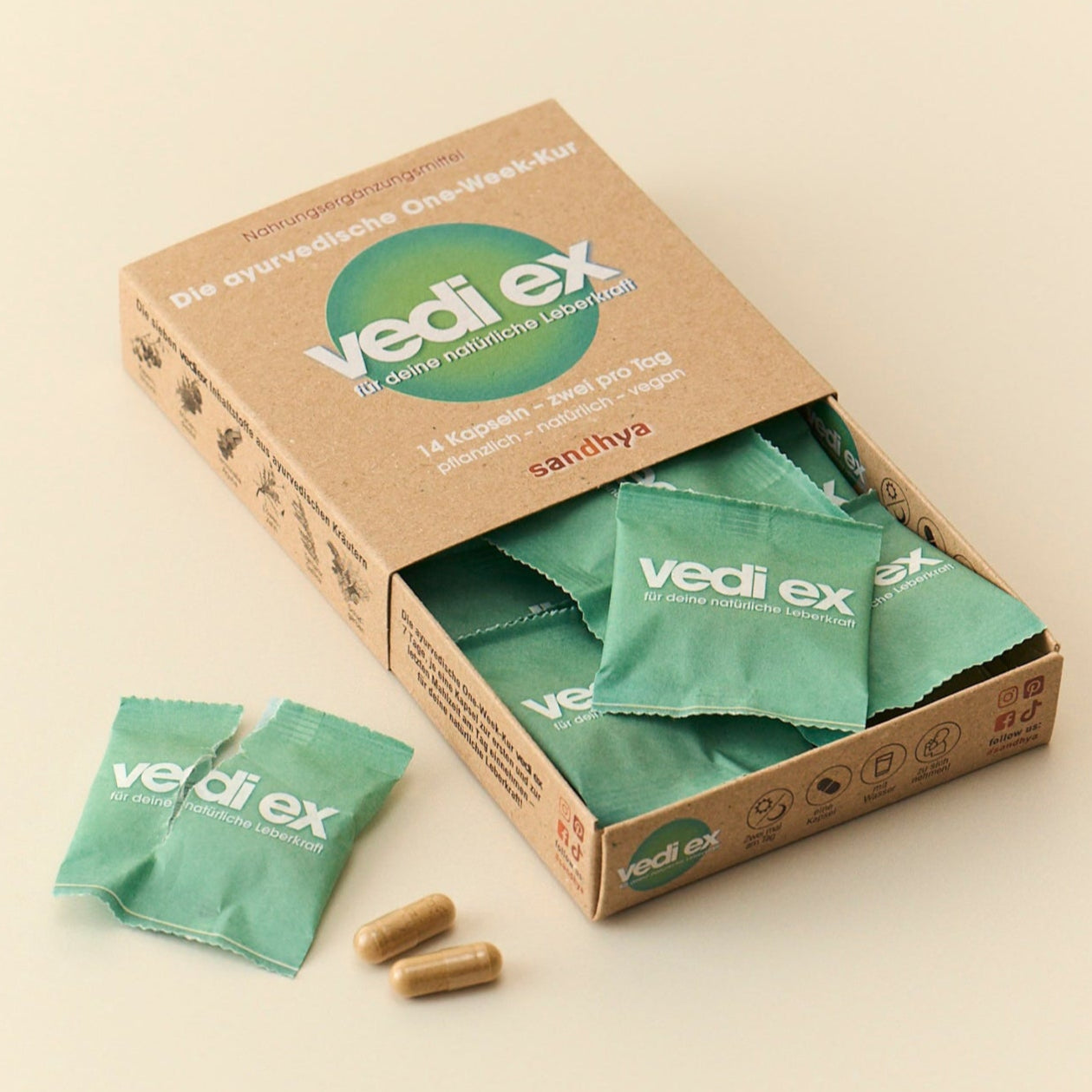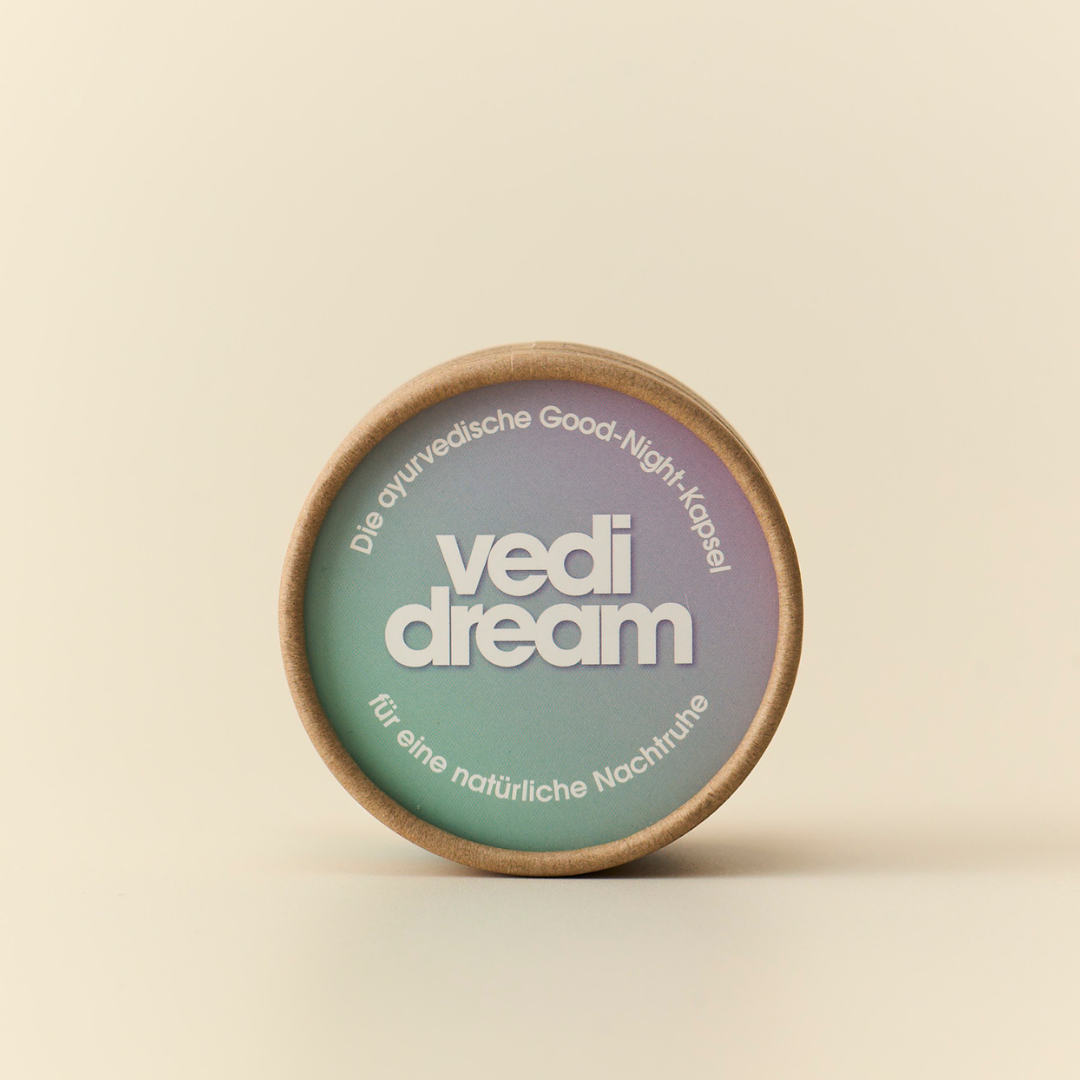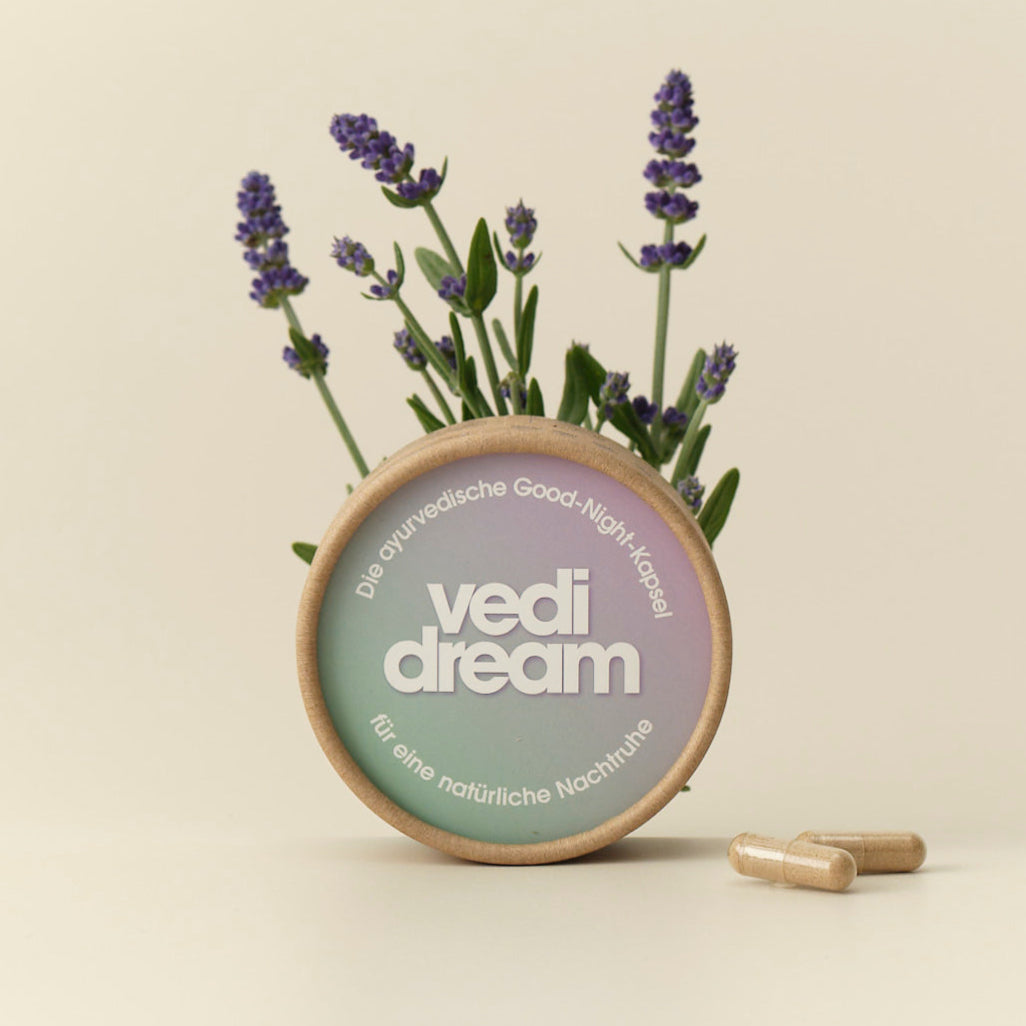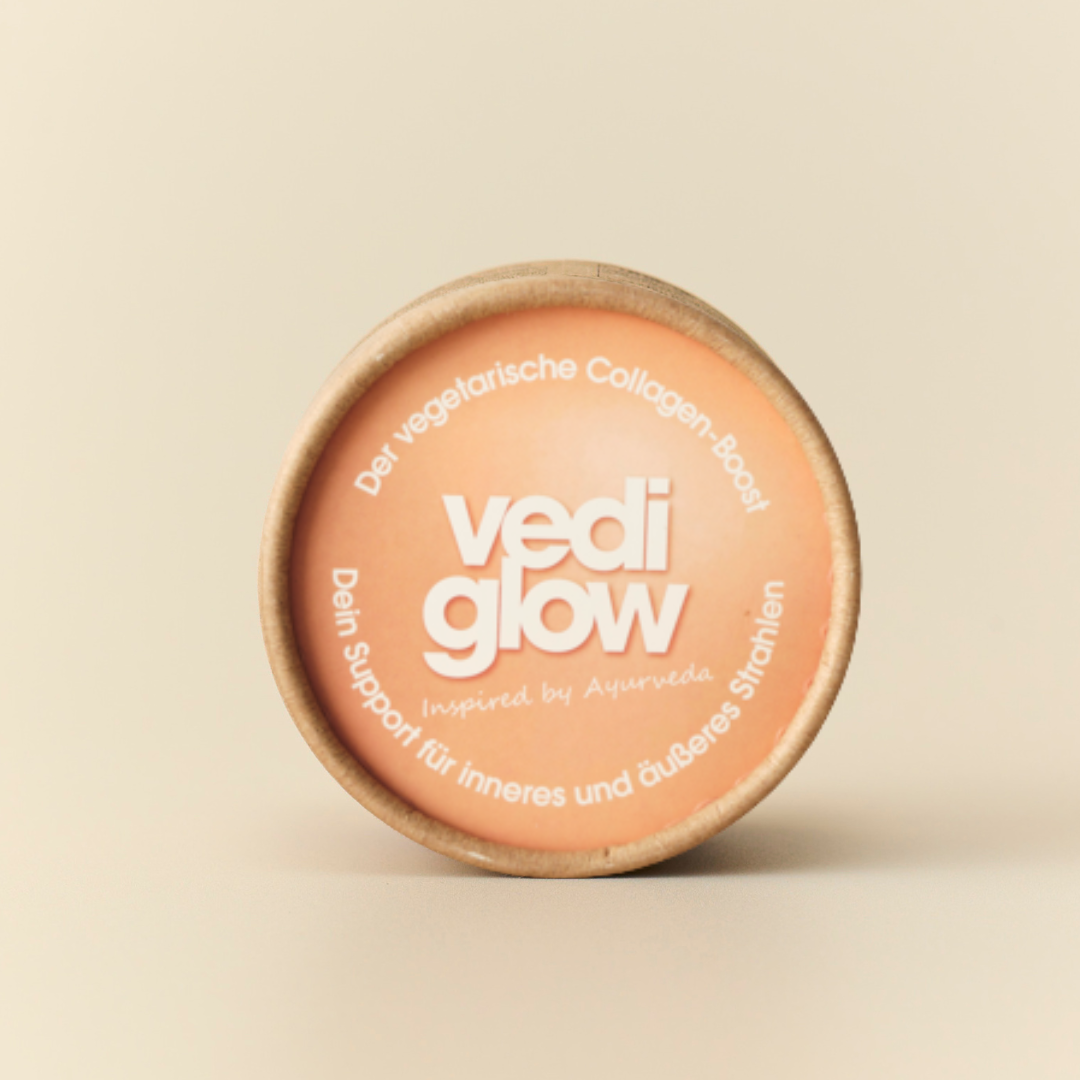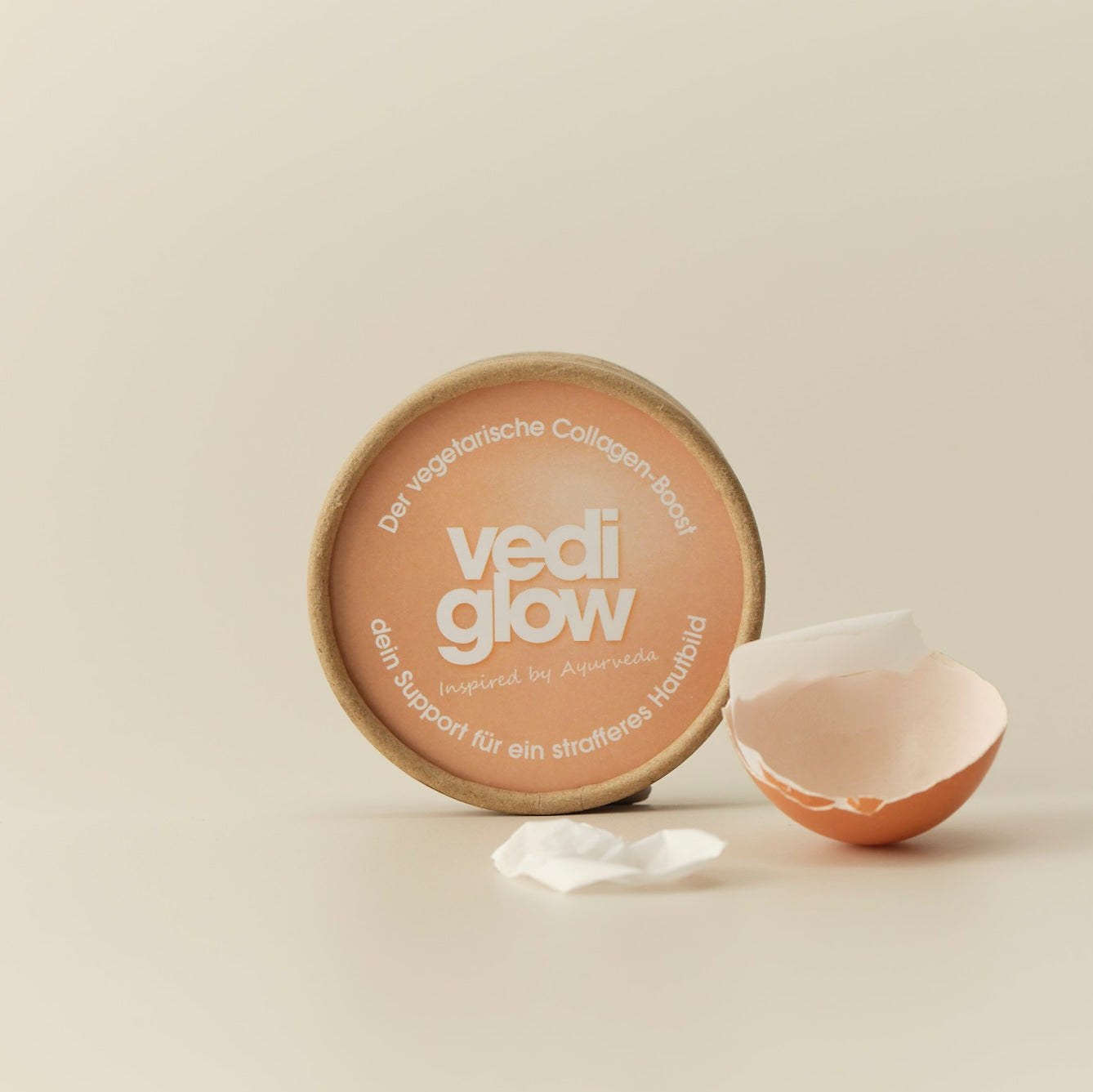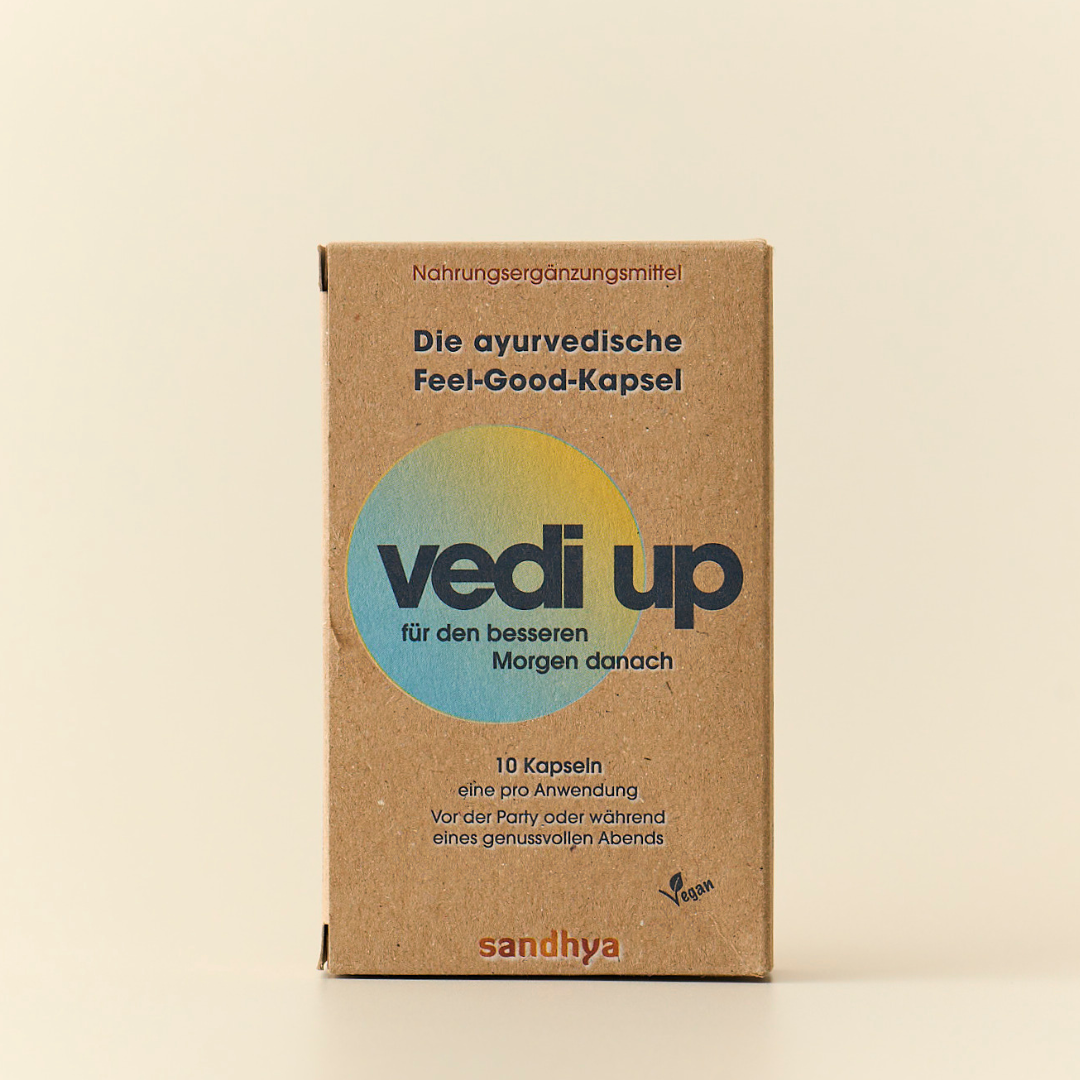
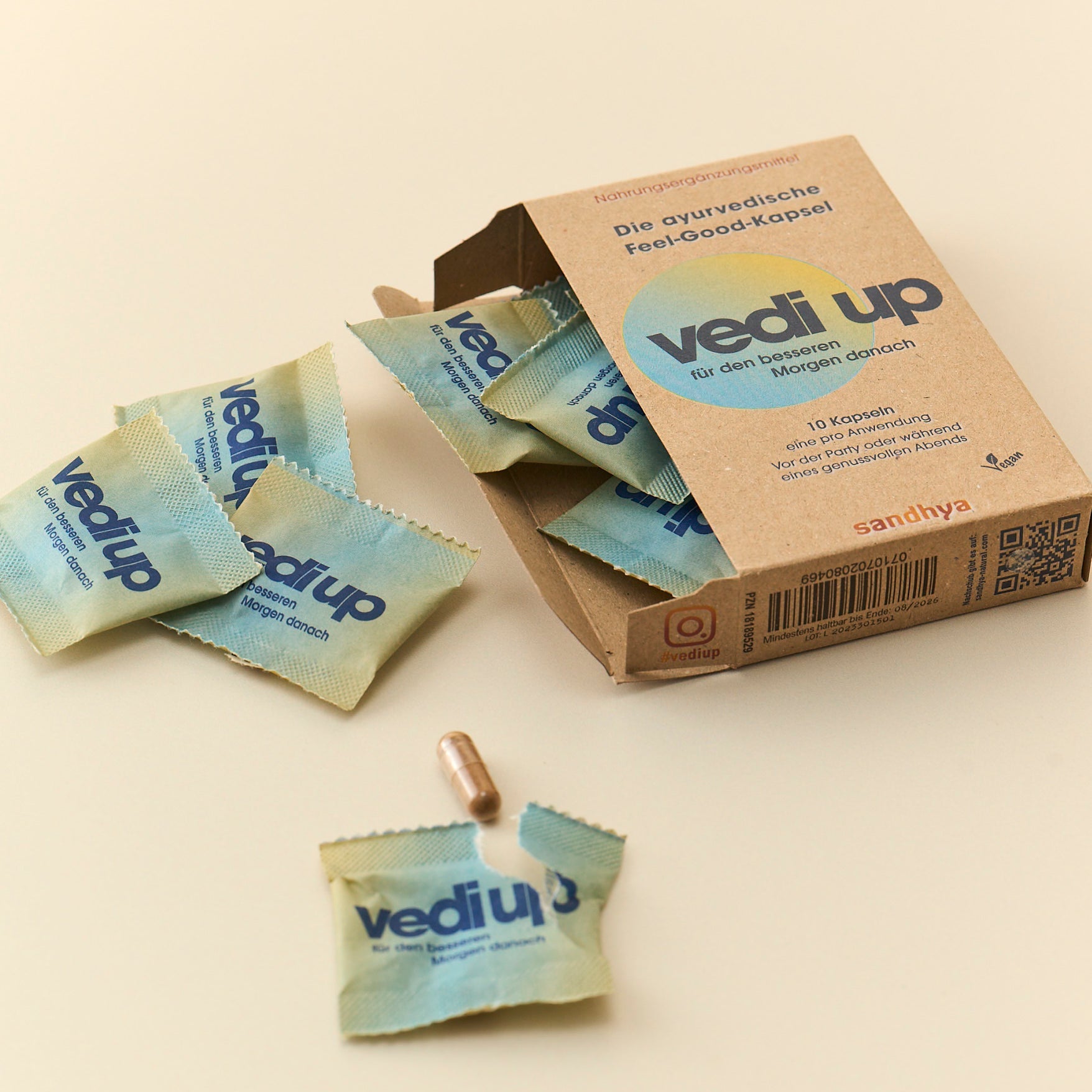
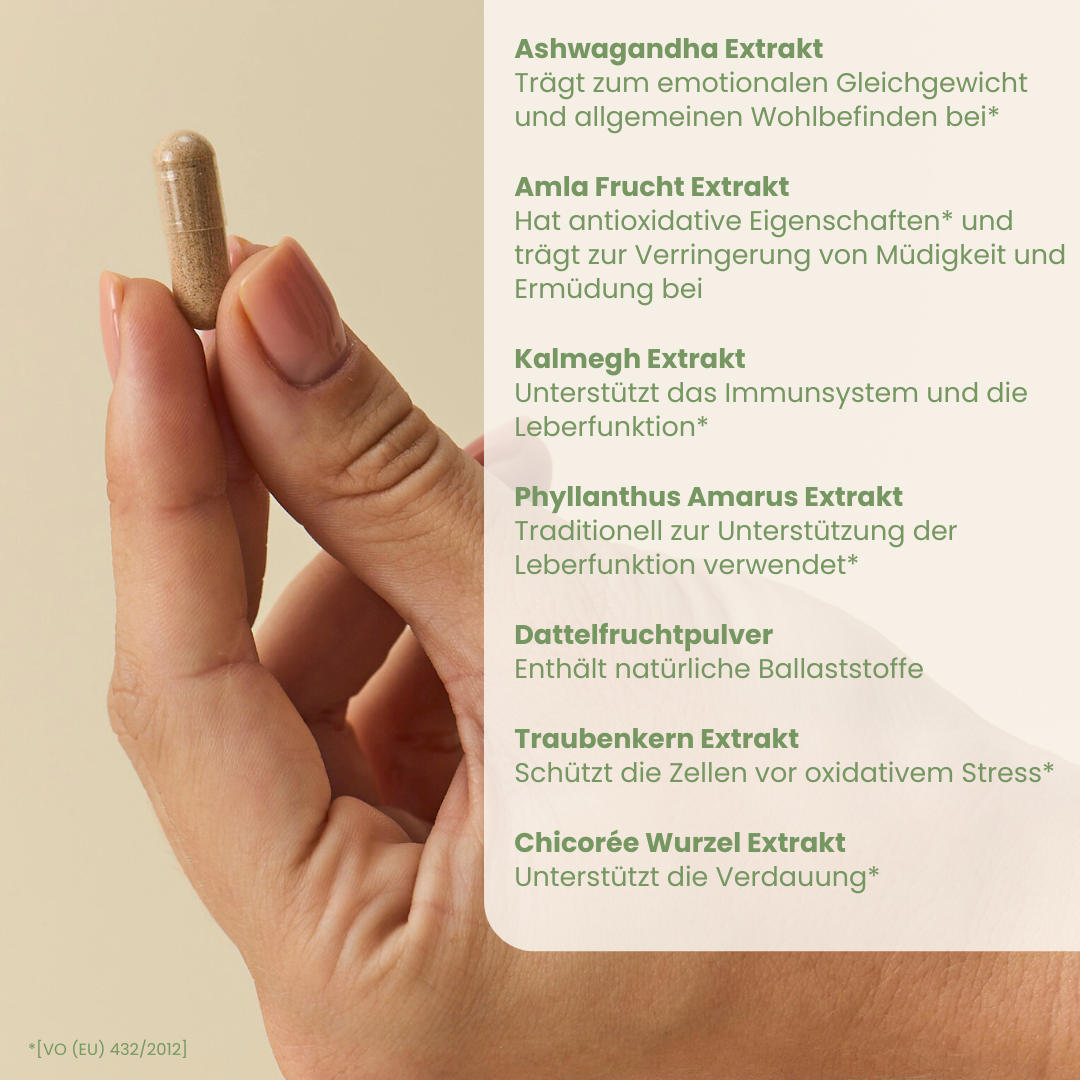
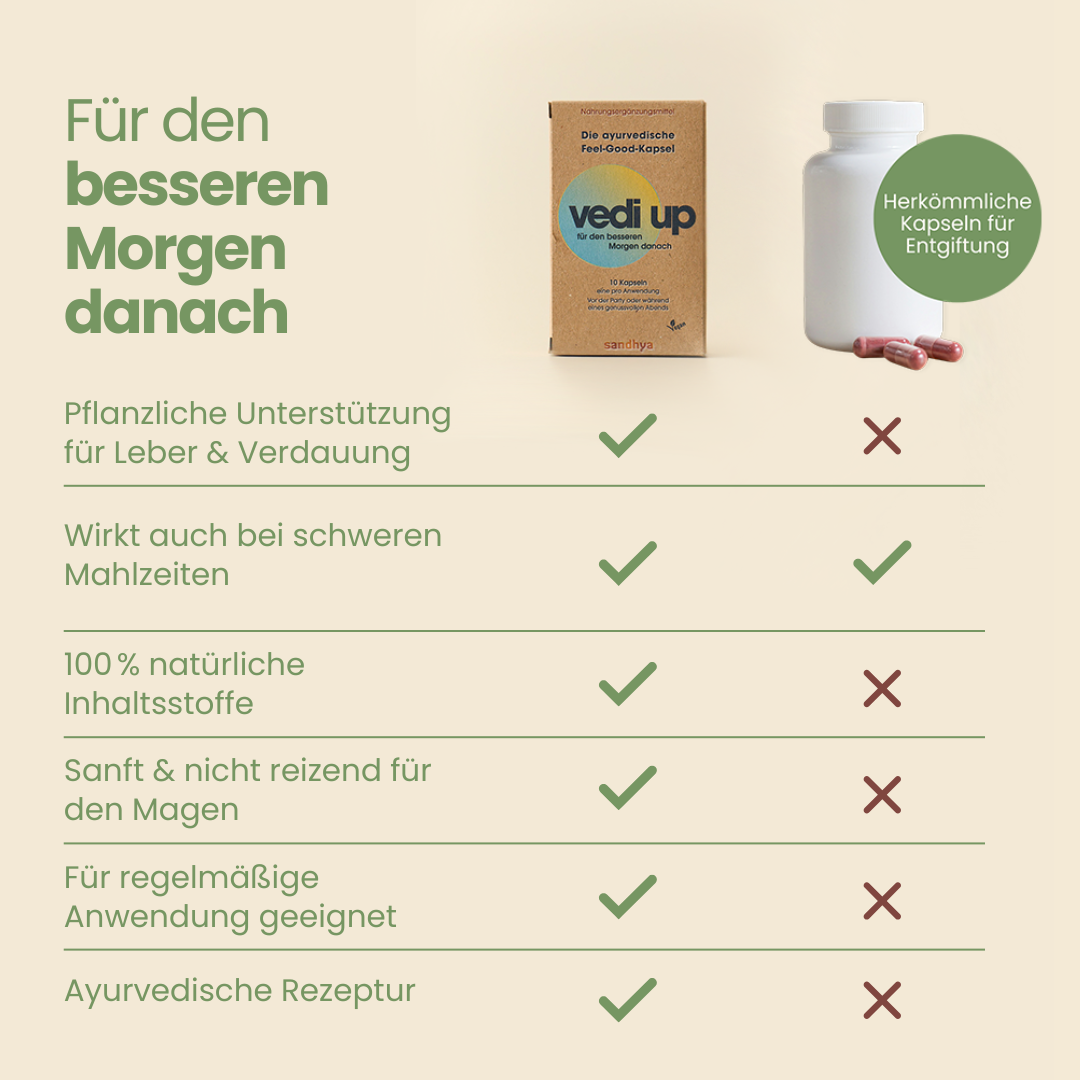

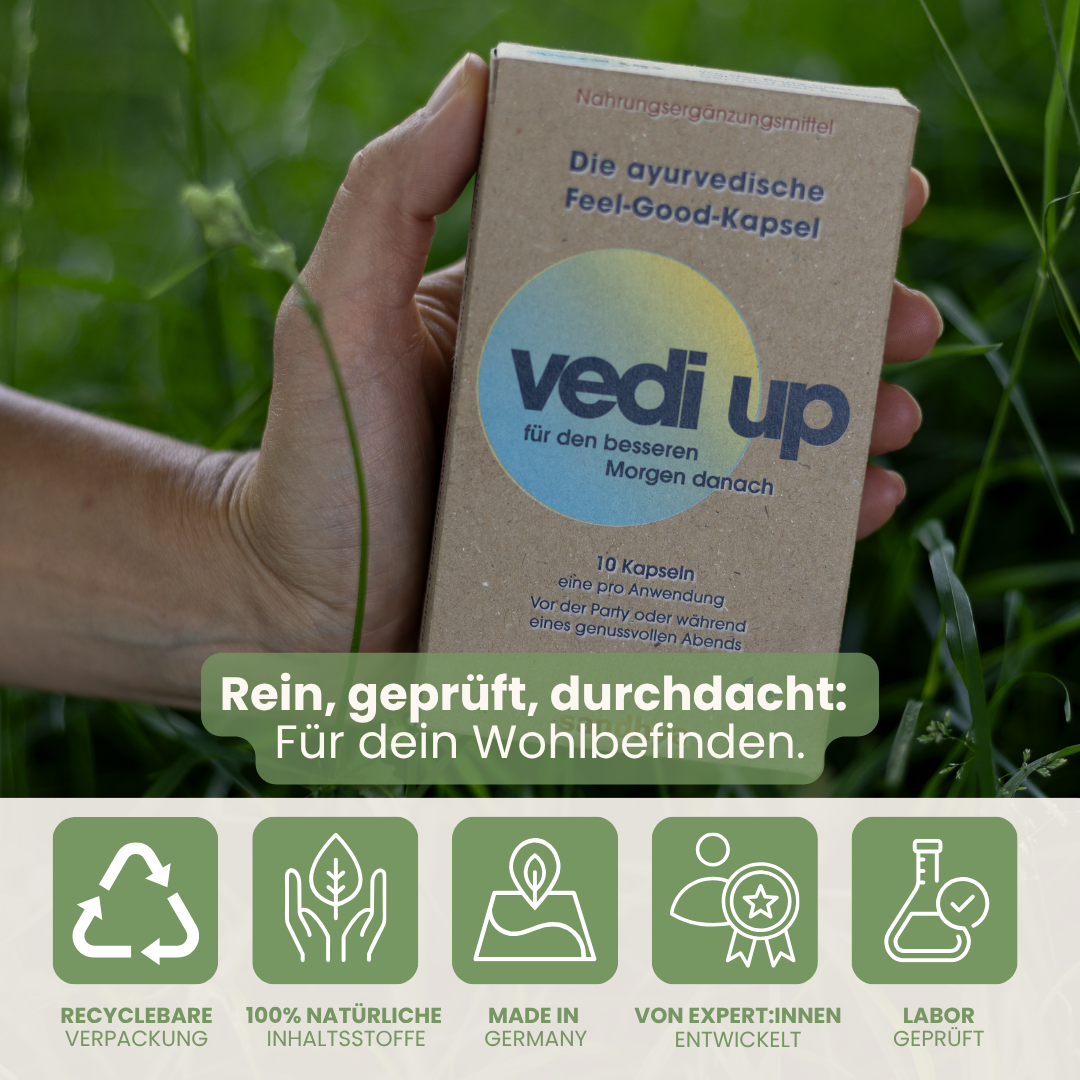

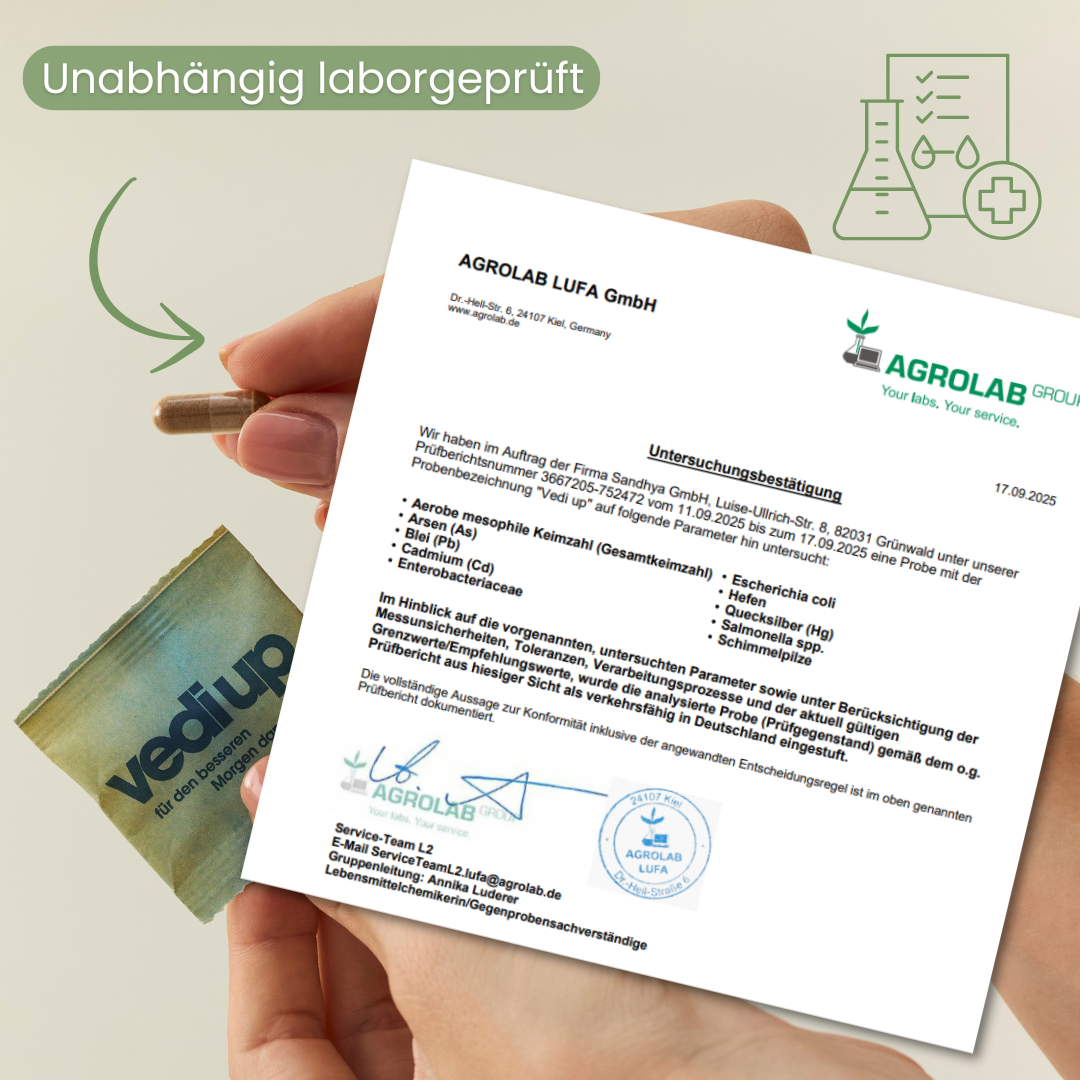
Fan Box
10er vedi up Box (10 Kapseln)
Ideal für Nacht- und Genussschwärmer – verbessere dein Aufwacherlebnis auf natürliche Weise mit 7 kraftvollen Pflanzenextrakten und starte erfrischt und voller Energie in den Tag.
Subscription Benefits
- Wähle, wie oft du deine Produkte erhalten möchtest
- Jederzeit kündigen oder Lieferung anpassen
- Spare 20% auf diese und alle folgenden Abo-Bestellungen
- 100% natürliche Inhaltsstoffe
- Streng laborgeprüft
Altbewährte Pflanzenkunde¹ zur Unterstützung bei körperlicher Anstrengung²
Ayurvedische Rezeptur mit ausgewählten Pflanzenextrakten
Vegan, rein & pflanzlich
Hochdosierte Inhaltsstoffe
 Von Experten*innen in der Schweiz entwickelt
Von Experten*innen in der Schweiz entwickelt
Die vedi up Kapsel aus 7 ayurvedischen Pflanzenextrakten und natürlichem Vitamin C:
Chicoréewurzel Extrakt, Amla Extrakt (30% Vitamin C), Ashwagandha Extrakt, Traubenkern Extrakt, Phyllanthus Amarus Extrakt, Dattelfruchtpulver, Kalmegh Extrakt, Kapselhülle: Hydroxypropylmethylcellulose (vegan)
PZN DE: 18189529
Häufig gestellte Fragen zu vedi up:
Wann und wie wird vedi up angewendet?
vedi up wird idealerweise vor oder während körperlich oder mental fordernder Phasen eingenommen – z. B. bei Stress, nach einem schweren Essen oder an langen Tagen. Eine Kapsel am Abend genügt in der Regel. Bei Bedarf kannst du auch tagsüber eine zweite Kapsel ergänzen.
Was macht vedi up so außergewöhnlich?
Unsere Kapseln enthalten eine einzigartige ayurvedische Rezeptur, entwickelt von Experten. Sie kombinieren kostbare Pflanzenextrakte mit einem hohen Anteil an natürlichen Bitterstoffen, Vitaminen und Mineralstoffen. In der ayurvedischen Lehre werden diese Inhaltsstoffe traditionell zur Stärkung der Leberfunktion und zur inneren Balance eingesetzt.
Gibt es nicht genügend Bitterstoffe in unserer Ernährung?
Leider nicht. In der modernen Ernährung wurden Bitterstoffe nach und nach verdrängt – weil sie als „zu bitter“ empfunden wurden. Dabei sind sie wertvoll für Verdauung, Stoffwechsel und Balance.
Noch Fragen?
Du kannst uns jederzeit schreiben unter service@sandhya-natural.com.
Verzehrempfehlung: Bei Bedarf eine Kapsel (max. Dosis) mit einem
Glas Wasser einnehmen.
Lagerhinweis: Geschlossen, kühl
(bei +4° bis +25° C) und trocken lagern.
Wichtige Hinweise: Nur für den Verzehr durch Erwachsene geeignet. Nicht für schwangere und stillende Frauen geeignet. Außerhalb der Reichweite von kleinen Kindern lagern. Die angegebene empfohlene tägliche Verzehrmenge darf nicht überschritten werden. Nahrungsergänzungsmittel sollten nicht als Ersatz für eine ausgewogene und abwechslungsreiche Ernährung verwendet werden.
Die ayurvedische Lehre blickt auf jahrtausendealtes Wissen zurück, das auch heute noch von großer Bedeutung ist. Zu den in Vedi Up enthaltenen Pflanzenextrakten gibt es zahlreiche Studien in der modernen Phytotherapie.
Aufgrund gesetzlicher Vorgaben dürfen wir jedoch keine konkreten gesundheitsbezogenen Aussagen zu den Inhaltsstoffen machen. Wir setzen daher auf größtmögliche Transparenz und verweisen auf aktuelle Studien und Quellen, die du selbst recherchieren kannst. Vielen Dank für dein Verständnis.
Antioxidative Unterstützung - Traubenkernextrakt:
Bagchi, Debasis, et al. (2000): "Free radicals and grape seed proanthocyanidin extract: importance in human health and disease prevention."
Link zur Studie
Park, Eunyoung, et al. (2016): "Effects of grape seed extract beverage on blood pressure and metabolic indices in individuals with pre-hypertension."
Link zur Studie
Feringa, Harm HH, et al. (2011): "The effect of grape seed extract on cardiovascular risk markers: a meta-analysis of randomized controlled trials."
Link zur Studie
Preuss, Harry G., et al. (2000): "Effects of niacin-bound chromium and grape seed proanthocyanidin extract on the lipid profile of hypercholesterolemic subjects: a pilot study."
Link zur Studie
Stressabbau und Vitalitätssteigerung - Ashwagandha
Chandrasekhar, K., et al. (2012): "A prospective, randomized double-blind, placebo-controlled study of safety and efficacy of a high-concentration full-spectrum extract of ashwagandha root in reducing stress and anxiety in adults."
Link zur Studie
Salve, Jaysingh, et al. (2019): "Adaptogenic and Anxiolytic Effects of Ashwagandha Root Extract in Healthy Adults: A Double-blind, Randomized, Placebo-controlled Clinical Study."
Link zur Studie
Langade, Deepak, et al. (2019): "Efficacy and Safety of Ashwagandha (Withania somnifera) Root Extract in Insomnia and Anxiety: A Double-blind, Randomized, Placebo-controlled Study."
Link zur Studie
Lopresti, Adrian L., et al. (2019): "An investigation into the stress-relieving and pharmacological actions of an ashwagandha (Withania somnifera) extract: A randomized, double-blind, placebo-controlled study."
Link zur Studie
Lopresti, Adrian L., et al. (2019): "A Randomized, Double-Blind, Placebo-Controlled, Crossover Study Examining the Hormonal and Vitality Effects of Ashwagandha (Withania somnifera) in Aging, Overweight Males."
Link zur Studie
Coles, Terrence B., et al. (2009): "Naturopathic care for anxiety: a randomized controlled trial ISRCTN78958974."
Link zur Studie
Immununterstützung - Kalmegh Kraut:
Thamlikitkul, V., et al. (1991): "Use of visual analogue scale measurements (VAS) to asses the effectiveness of standardized Andrographis paniculata extract SHA-10 in reducing the symptoms of common cold. A randomized double blind-placebo study."
Link zur Studie
Nährstoffsupport und antioxidativ - Dattelfruchtpulver:
Al-Farsi, M., et al. (2019). "Development and Evaluation of Date Bars for Iron Bioavailability in Iron-Deficient Rats." Foods, 8(8), 297.
Link zur Studie
Tang, Z.-X., et al. (2022). "Date fruit (Phoenix dactylifera L.) intake reduces the blood lipid levels in humans: a systematic review and meta-analysis." Nutrition & Metabolism, 19, 45.
Link zur Studie
Al Alawi, A., et al. (2022). "Phoenix dactylifera L. (date palm) fruits as a potential cardioprotective agent: the richness of phytochemicals and a review of their beneficial effects on cardiovascular health." Journal of the Saudi Society of Agricultural Sciences, 21(5), 287-297.
Link zur Studie
Stoffwechsel- und antioxidative Unterstützung- Amla Frucht:
Akhtar, M. S., et al. (2011). "Effect of Amla fruit (Emblica officinalis Gaertn.) on blood glucose and lipid profile of normal subjects and type 2 diabetic patients." International Journal of Food Sciences and Nutrition, 62(6), 609-616.
Link zur Studie
Yokozawa, T., et al. (2010). "Amla (Emblica officinalis Gaertn.) attenuates age-related renal dysfunction by oxidative stress." Journal of Agricultural and Food Chemistry, 58(18), 9792-9798.
Link zur Studie
Baliga, M. S., et al. (2022). "The Health Benefits of the Ayurvedic Anti-Aging Drugs (Rasayanas): An Evidence-Based Revisit." Journal of Ethnopharmacology, 282, 114646. Link zur Studie
Usharani, P., et al. (2015). "Effects of Phyllanthus emblica extract on endothelial dysfunction and biomarkers of oxidative stress in patients with type 2 diabetes mellitus: a randomized, double-blind, controlled study." Diabetes, Metabolic Syndrome and Obesity: Targets and Therapy, 8, 275-284.
Link zur Studie
Suryanarayana, P., et al. (2021). "Emblica officinalis (Amla) ameliorates high-fat diet-induced alterations in mitochondrial enzymes and reduces visceral fat in rats." Phytotherapy Research, 35(10), 5687-5699.
Link zur Studie
Tara Shanbhag, et al. (2012). "Pharmacological actions of the aqueous extract of Emblica officinalis: a study on the isolated frog heart preparation." International Journal of Basic & Clinical Pharmacology, 1(2), 94-99. Link zur Studie
Leberschutz - Bittere Kreuzblume (Phyllantus Amarus):
Khatoon, S., et al. (2011). "Comparative pharmacognostic and phytochemical analysis of Phyllanthus species." Journal of Scientific and Industrial Research, 70, 887-896.
Link zur Studie
Bagalkotkar, G., et al. (2020). "Phytochemicals from Phyllanthus niruri Linn. and their pharmacological properties: a review." Journal of Pharmacy and Pharmacology, 58(12), 1559-1570. Link zur Studie
Raphael, T. J., et al. (2012). "Anti-diabetic activity of Phyllanthus amarus extract: an in vitro study." Journal of Health Science, 58(5), 497-502.
Link zur Studie
Patel, J. R., et al. (2016). "Phyllanthus amarus: Ethnomedicinal uses, phytochemistry and pharmacology: A review." Journal of Ethnopharmacology, 188, 5-16.
Link zur Studie
Verdauungsförderung - Chicorée Wurzel:
Nwafor, I. C., et al. (2019). "Prebiotic effects of inulin extracted from chicory (Cichorium intybus) root on the HCT116 human colon cancer cell line." Toxicology Reports, 6, 210-222.
Link zur Studie
Petrova, P., et al. (2022). "Inulin-type fructans from chicory (Cichorium intybus L.) root induce changes in the gut microbiota of healthy humans." Food Research International, 150, 110729.
Link zur Studie

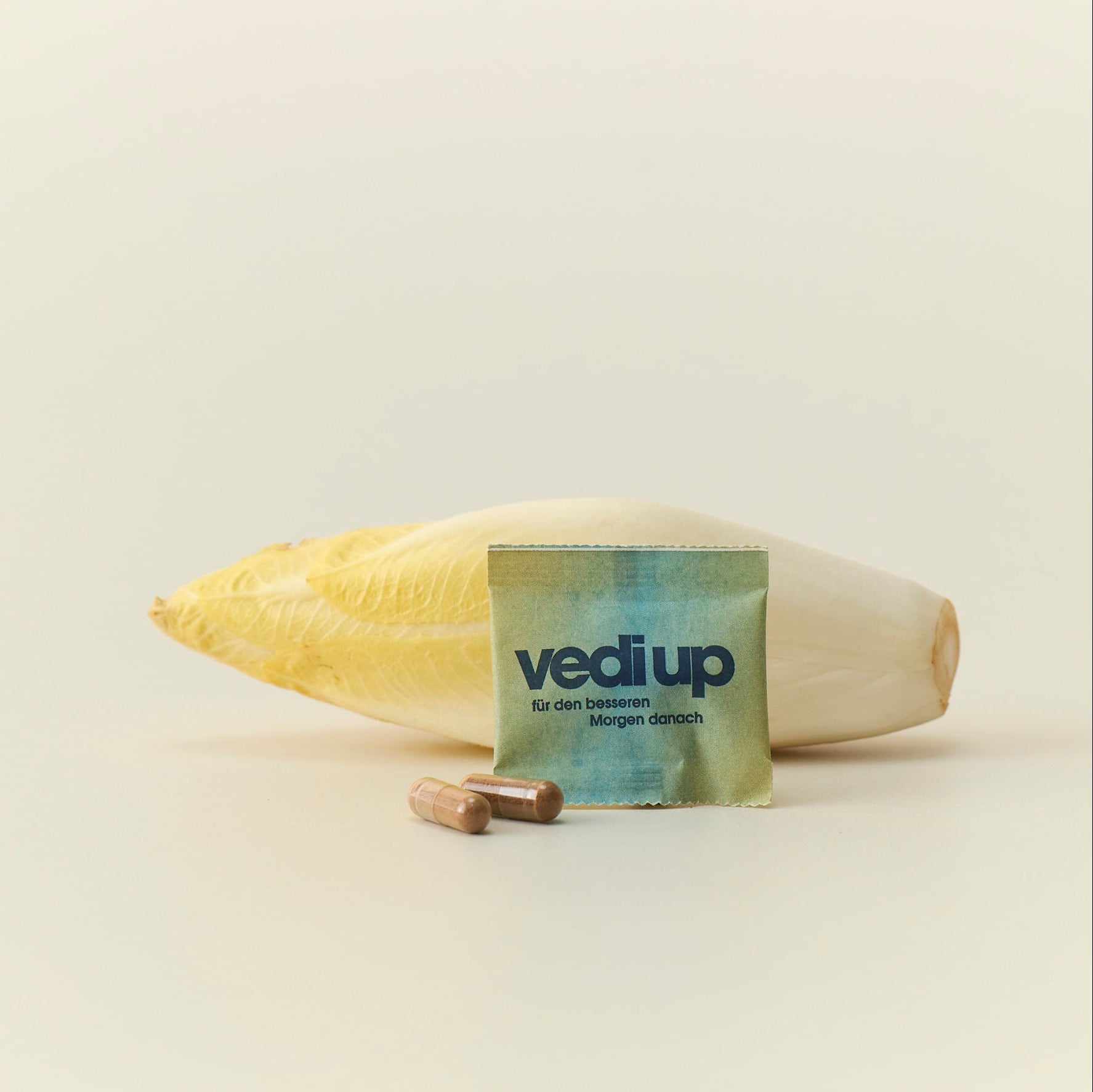
Bitterstoffe, please!
Bitterstoffe kommen in unserer Ernährung kaum noch vor – dabei sind sie entscheidend für Leber, Verdauung und Balance. Der natürliche bittere Geschmack wurde über die Jahre fast vollständig herausgezüchtet. Kein Wunder, dass uns etwas fehlt. Besonders wenn es mal zu viel des Guten war, sind Bitterstoffe echte Game-Changer.

Genuss mit Balance
vedi up wurde entwickelt, um deinen Körper in Momenten bewussten Genusses zu unterstützen – wenn das Essen etwas üppiger war oder du deinem Wohlbefinden etwas Gutes tun möchtest. Die pflanzliche Rezeptur begleitet die nächtliche Regeneration sanft und gezielt. Eine Kapsel am Abend genügt, damit du am nächsten Tag im Gleichgewicht bleibst.
Für jeden das passende Bundle
Entdecke unsere Bundles: Passend zu Deinem Alltag, für jede Lebensphase und zum doppelten Sparen.
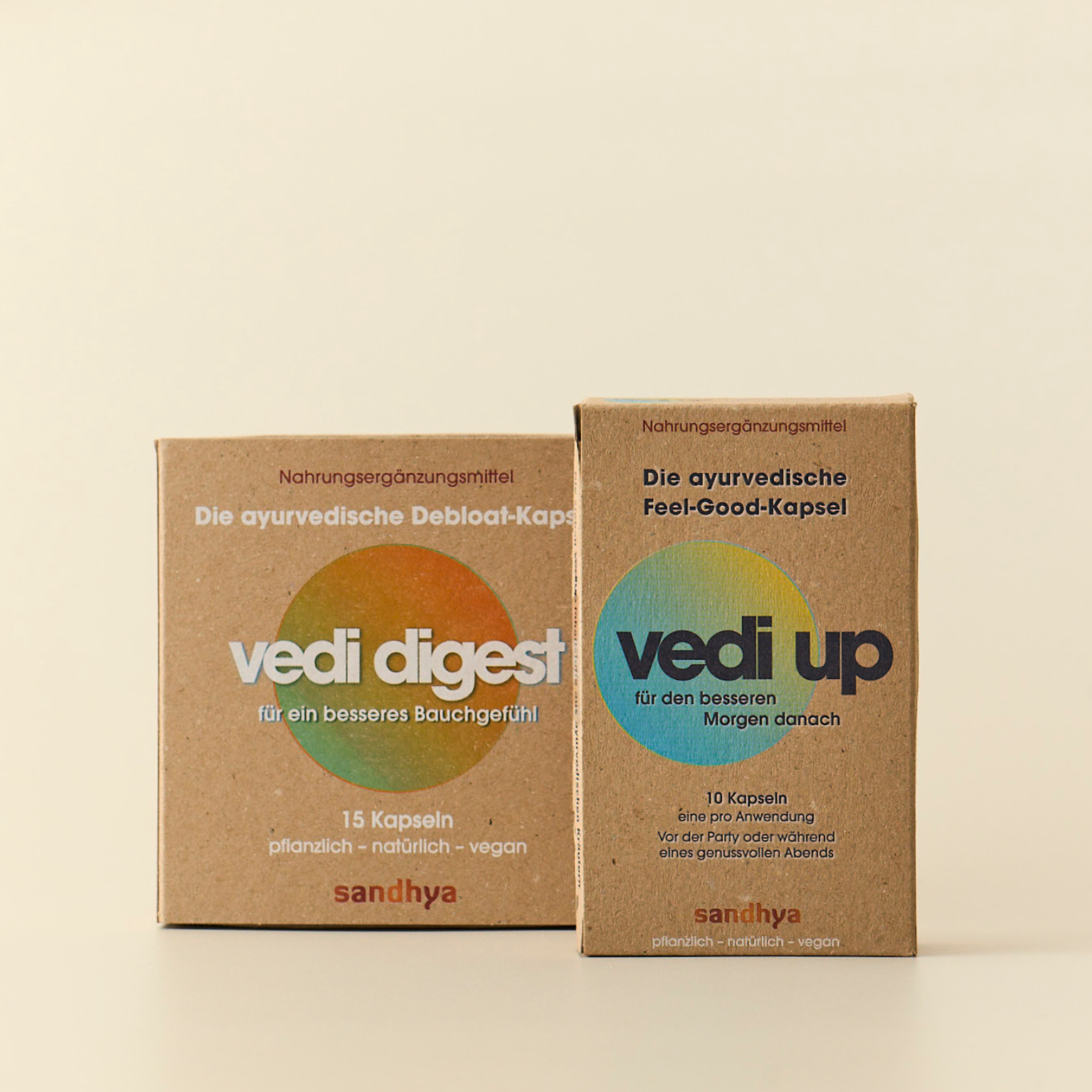
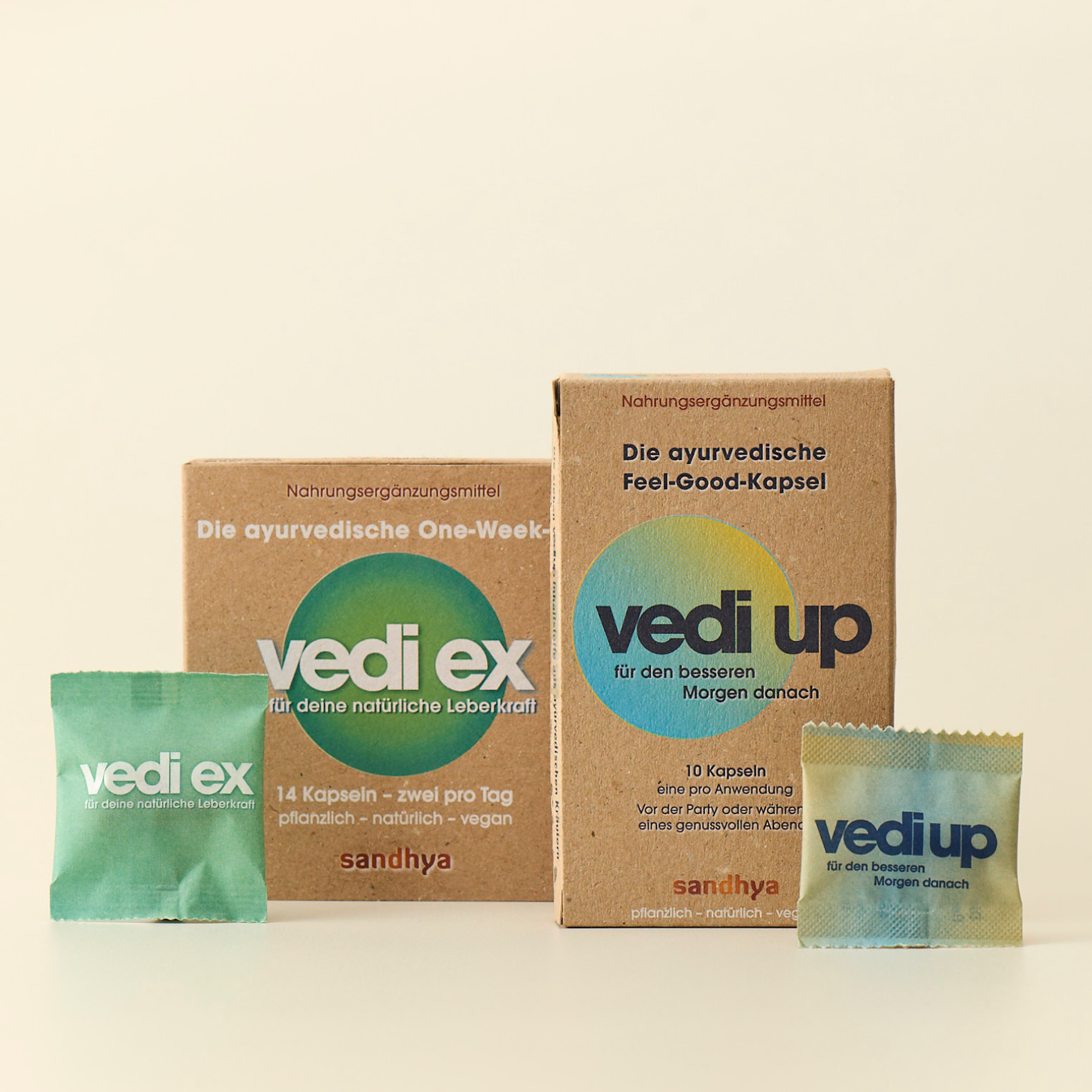
Manchmal braucht der Körper eine kleine Auszeit – und die Leber etwas Extra-Aufmerksamkeit. vedi up enthält eine ayurvedisch inspirierte Pflanzenmischung, die traditionell bei genussvollen Abenden geschätzt wird, um den nächsten Tag leichter zu starten. vedi ex ist eine 7-tägige Kur mit sechs ausgewählten Pflanzenextrakten, die in der ayurvedischen Tradition für Phasen innerer Reinigung und bewusster Ernährung verwendet werden.
Ein gutes Essen oder ein besonderer Abend dürfen in vollen Zügen genossen werden – am besten mit einer kleinen Portion Pflanzenkraft an Deiner Seite.
vedi digest vereint sieben ayurvedisch inspirierte Pflanzenextrakte, die traditionell nach dem Essen geschätzt werden, um die Verdauung sanft zu begleiten. vedi up ergänzt Dein Abendritual mit einer Pflanzenmischung, die in der ayurvedischen Tradition für ihre wohltuenden Eigenschaften an genussvollen Abenden bekannt ist.
100% PFLANZENKRAFT
Key-Inhaltsstoffe
Die sorgfältig abgestimmte Zusammensetzung aus sieben Pflanzenextrakten macht vedi up zur idealen Begleitung für genussvolle Abende.

Chicorée Wurzel Extrakt unterstützt die Verdauung*

Amla Frucht mit Vitamin C hat antioxidative Eigenschaften*

Dattelfrucht Pulver enthält B-Vitamine und Mineralien

Traubenkern Extrakt schützt die Zellen vor oxidativem Stress*
Anderes Produkt gefällig?


